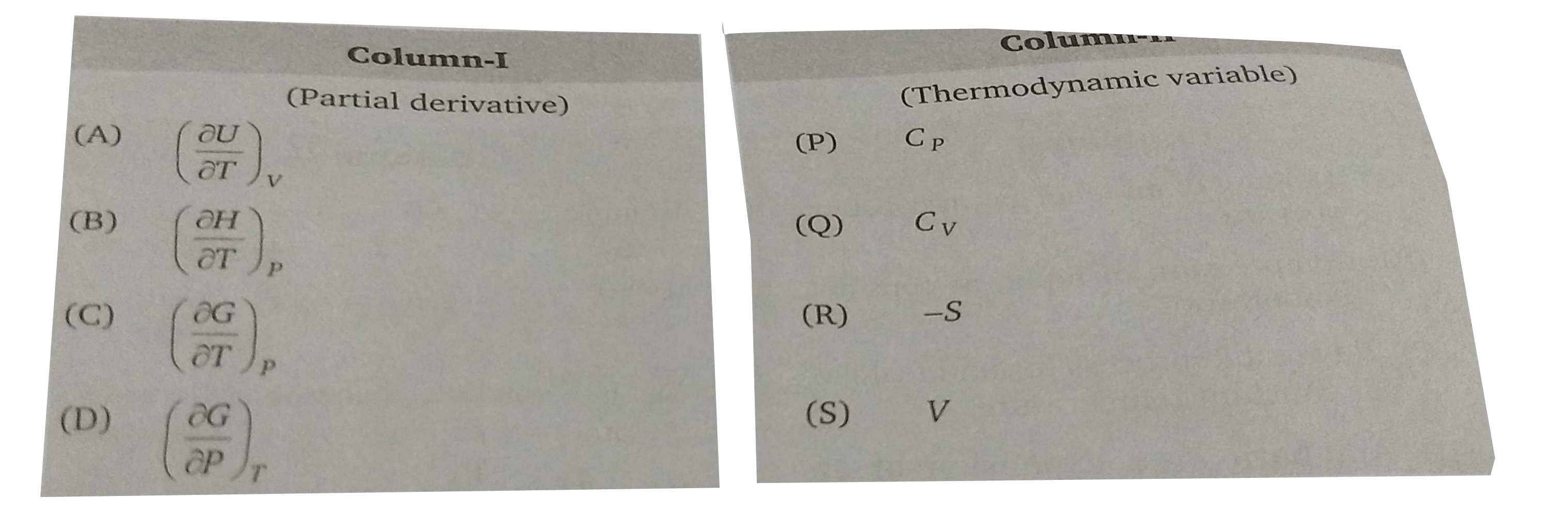Consider the following reaction.
signs of and for the above reaction will be
a)
b)
c)
d) Solution in Punjabi
The correct Answer is:B
Topper's Solved these Questions
- THERMODYNAMICSBOOK - NARENDRA AWASTHICHAPTER - THERMODYNAMICSEXERCISE - Level 3 - One Or More Answers Are Correct
1 Videos
- THERMODYNAMICSBOOK - NARENDRA AWASTHICHAPTER - THERMODYNAMICSEXERCISE - Level 3 - Match The Column
2 Videos
- THERMODYNAMICSBOOK - NARENDRA AWASTHICHAPTER - THERMODYNAMICSEXERCISE - Level 2 (Q.1 To Q.30)
1 Videos
- STOICHIOMETRYBOOK - NARENDRA AWASTHICHAPTER - STOICHIOMETRYEXERCISE - Level 3 - Subjective Problems
20 Videos
Similar Questions
Assume ideal gas behaviour for all the gases considered and neglect vibrational degrees of freedom. Separate equimolar sample. Separate equimolar samples of Ne, O2 , CO2 and SO2 were subjected to a two process as mentioned. Initially all are at same state of temperature and pressue.
Step I → All undergo reversible adiabatic expansion to attain same final volume, which is double the original volume thereby causing the decreases in their temperature.
Step → After step I all are given appropriate amount of heat isochorically to restore the original temperature.
Mark the correct option(s) :
View SolutionMatch the following columns

View SolutionWrite structure of 2,2-dimethylheptane.
View SolutionWhat volume of a liquid (in L) will contain 10 mole ? If molar mass of liquid is 280 and its density is 1.4 g/mL.
View SolutionFor the raction
B2H6(g)+3O2(g)→B2O2(s)+3H2O(l)
ΔE=−2143.2KJ
Calculate ΔH for the reaction at 25∘C
View SolutionC2H6(g)+72O2(g)→2CO2(g)+3H2O(g)
ΔH∘=−1427.7KJ
If the enthalpy of vaporization for H2O(l)is 44.0 KJ.mol, what is ΔH∘ for this reaction if H2O(l) is formed insteat of H2O(g)?
View SolutionConsider the following spontaneous reaction 3X2(g)→2X3(g). What are the sign of ΔH, ΔS and ΔG for the reaction ?
View SolutionConsider the following reaction. C_(6)H_(6)(l)+(15)/(2)O_(2)(g)rarr6CO_(2)(g)+3H_(2)O(g) signs of DeltaH, DeltaS and DeltaG for the above reaction will be
View SolutionAt 27^(@)C for reaction, C_(6)H_(6)(l)+(15)/(2)O_(2)(g)to6CO_(2)(g)+3H_(2)O(l) proceeds spontaneously because the magnitude of
View SolutionFor the combustion of 1 mole of liquid benzene at 25∘C, the heat of reaction at constant pressure is given by C6H6(l)+712O2(g)→6CO2(g)+3H2O(l),ΔH=−780980cal.
What would be the heat of reaction at constant volume ?
View SolutionThe heat evolved in the combustion of benzene is given by C_(6)H_(6)+7(1)/(2)O_(2)rarr6CO_(2)(g)+3H_(2)O(l),DeltaH=-3264.6 kJ Which of the following quantities of heat energy will be evolved when 39_(g)C_(6)H_(6) are burnt
View SolutionConsider the reaction, C(s)+O_(2)(g)toCO_(2)(g)+393.5kJ , the signs of DeltaH,DeltaS and DeltaG respectively are
View SolutionFrom the following data, C(s , graphite) + O_(2) (g) to CO_(2) (g) H_(2) (g) + (1)/(2) O_(2) (g) to H_(2) O (l) Delta H_("reaction")^(@) = -286 kJ/mole 2 C_(2) H_(6) (g) + 7O_(2) (g) to 4 CO_(2) (g) + 6H_(2) O (l) Delta H_("reaction")^(@) = -3120 kJ/mole Calculate the standard enthalpy of formation of C_(2) H_(6) (g) ( in kJ/mole)
View SolutionDeltaH value for the given reactions at 25^(@)C are- C_(3)H_(8)(g)to3C(s)+4H_(2)(g),DeltaH^(0)=103.8kJ*mol^(-1) 2H_(2)(g)+O_(2)(g) to 2H_(2)O(l),DeltaH^(0)=-571.6kJ*mol^(-1) C_(2)H_(6)(g)+(7)/(2)O_(2)(g)to2CO_(2)(g)+3H_(2)O(l),DeltaH^(0)=-1560kJ*mol^(-1) CH_(4)(g)+2O_(2)(g) to CO_(2)(g)+2H_(2)O(l),DeltaH^(0)=-890kJ*mol^(-1) C(s)+O_(2)(g) to CO_(2)(g),DeltaH^(0)=-393.5kJ*mol^(-1) Calculate DeltaH^(0) for the reaction at 25^(@)C C_(3)H_(8)(g)+H_(2)(g)toC_(2)H_(6)(g)+CH_(4)(g)
View SolutionCalculate the enthalpy change for the reaction: C2H4(g)+3O2(g)→2CO2(g)+2H2O(l)
Given:C2H6(g)+72O2(g)→2CO2(g)+3H2O(l),ΔH0=−1562.0kJ
H2(g)+12O2(g)→H2O(l),ΔH0=−286.0kJ
C2H4(g)+H2(g)→C2H6(g),ΔH0=−32.0kJ
View SolutionCalculate the standard enthalpy of formation of C6H6(l) at 25∘C temperature using the given data:
C6H6(l)+152O2(g)→6CO2(g)+3H2O(l),ΔH0=−781kcal
H2(g)+12O2(g)→H2O(l),ΔH0=−68.32kcal
C (s, graphite)+O2(g)→CO2(g),ΔH0=−94.04kcal.
View Solution
